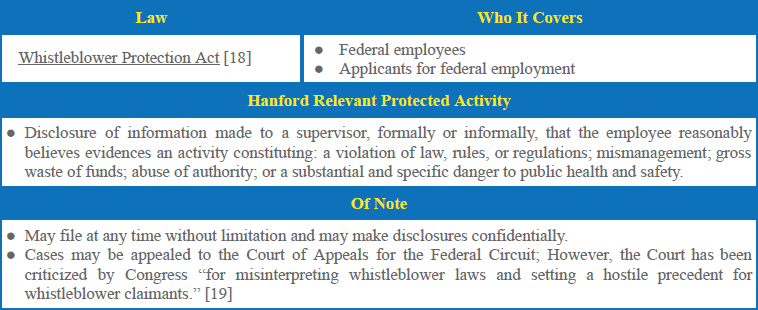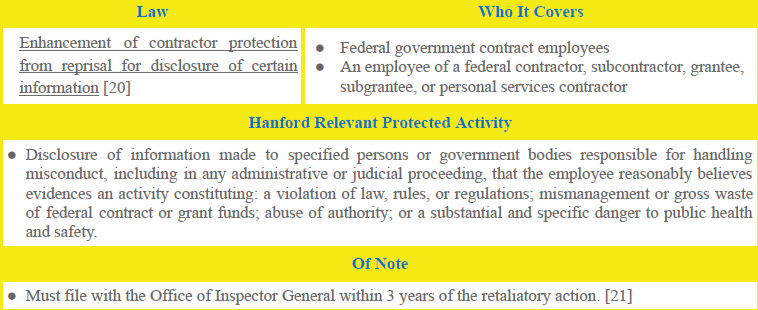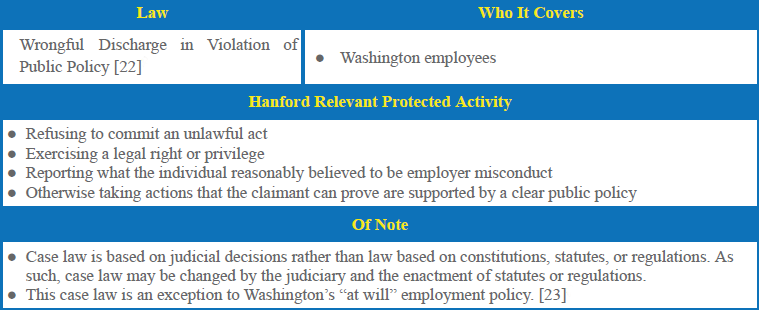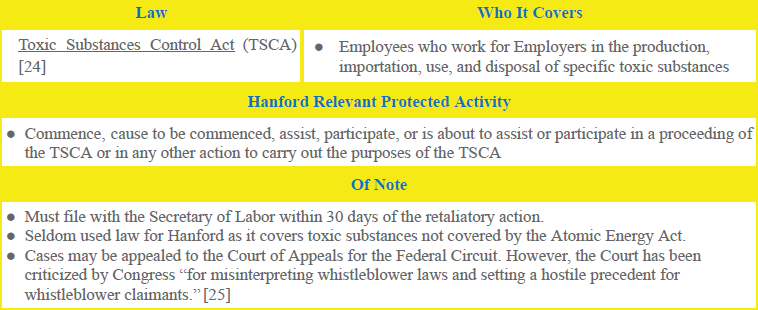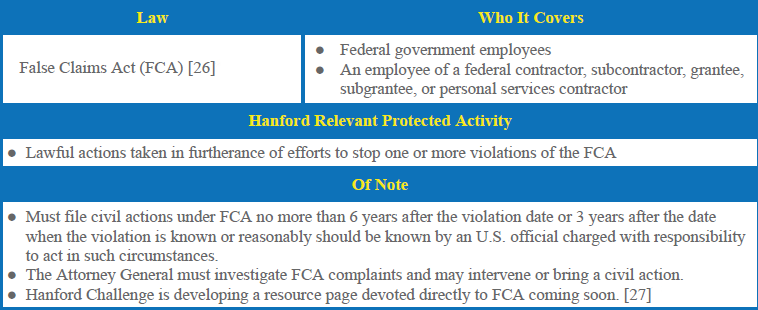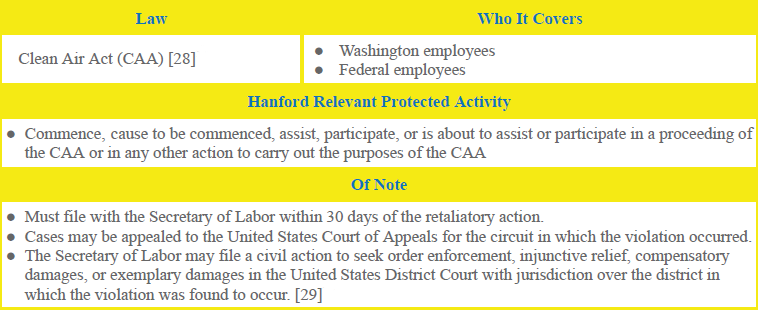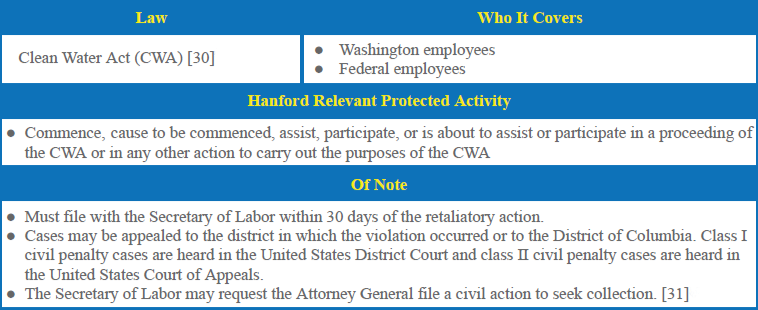Last Updated: December 2023
Hanford Challenge provides this Worker’s Resource for Whistleblower Rights webpage as a resource for Hanford workers, their friends and family, and other advocates to help understand the history and current status of whistleblower rights laws at Hanford.
Please be aware: The information provided does not, and is not intended to, constitute legal advice; instead, all information, content, and materials available are for general informational purposes only. Information may not be up-to-date legal or other information. Following whistleblower rules and procedures is important to secure protections against retaliation and, in some cases, financial rewards for assisting in the prosecution of the wrongdoer. For these reasons, we highly recommend that would-be whistleblowers consult with an attorney before attempting to blow the whistle. If you are in need of legal advice, contact Hanford Challenge’s Staff Attorney at BritanyL@HanfordChallenge.org or an attorney as soon as possible to ensure you meet all applicable procedures and deadlines.
WHISTLEBLOWING AT HANFORD NUCLEAR SITE
Cleanup at the Hanford Nuclear Site (Hanford) has had its fair share of success and failure. No matter what, Hanford’s workforce has been dedicated to providing quality work and standing up to unacceptable dangerous activity at Hanford for the safety of their workforce, community, Nation, and environment. We owe a debt of gratitude to past, present, and future Hanford whistleblowers for their dedication to a safe, effective, and accountable Hanford cleanup.
Hanford whistleblowers generally raise safety concerns and advocate against actions of the U.S. Department of Energy (DOE), contractors, and/or subcontractors that try to hide or minimize difficulties at Hanford to meet deadlines and keep money flowing. Most of the time, Hanford workers are just trying to do their job, but then find themselves labeled as a whistleblower. Safety is the top priority for workers engaged in complex cleanup operations at Hanford. Unfortunately, Hanford has a history and pattern of retaliating against those who speak up when they see a problem. Too often, Hanford has silenced whistleblowers regardless of the validity of their safety concerns.
Given this pattern and the uniquely high stakes at Hanford, Hanford whistleblowers have followed various paths through internal and/or external channels to get their safety concerns properly addressed. For example, compare safety concerns raised in 1979 by former Hanford tank farm surveillance manager Stephen Stalos with those raised in 2013 by a confidential source. In 1979, the DOE’s inspector general confirmed safety concerns reported by Mr. Stalos that the main contractor, Rockwell, conspired to conceal Hanford tank leaks. In 2013, Seattle's KING 5 TV News confirmed safety concerns raised by a confidential source regarding a series of hydrogen gas leaks from a Hanford tank that contractor Washington River Protection Solutions and the DOE concealed for a year and then downplayed as if the risk of a tank explosion was of little significance. Following a series of investigative stories from Seattle’s KING 5 News, DOE’s inspector general faulted DOE and Bechtel for the continued safety lapses and the Environmental Protection Agency drafted a report that faulted the Washington Department of Ecology for its lax oversight. [1]
PHOTO: Still frame from The Today Show’s report on ‘America’s Chernobyl’: Inside the Most Toxic Place in the Nation [2]
It is essential that Hanford establish and maintain a culture that both encourages and protects the raising of safety and environmental concerns. Hanford Challenge is dedicated to helping Hanford workers and whistleblowers navigate the complex maze of reporting safety concerns at Hanford. We do this mainly by providing guidance and legal representation to workers. We also guide workers through the reporting process; help workers report anonymously[*]; assist in litigation and settlement negotiations, when necessary; advocate for enforcing compliance with environmental laws; and advocate for improving rules, regulations, and policy related to whistleblower protections and safety at Hanford. Over the years, we have diligently helped hundreds of Hanford workers and whistleblowers advocate for a safer cleanup.
For example, Hanford Challenged represented Shelly Doss, a former environmental specialist at Hanford tank farms, in a case filed with the U.S. Department of Labor’s (DOL) against her former employer, Washington River Protection Solutions. In 2014, DOL’s Occupational Safety and Health Administration (OSHA) found “the contractor had violated federal whistleblower provisions when it fired Doss [] in October 2011 after she repeatedly raised issues of nuclear and environmental safety plus permit and record-keeping violations” and ordered that the contractor rehire Doss and pay her over $220,000. [3]Both parties asked for a review by an administrative law judge and ultimately reached a settlement in 2015. The settlement was approved by the judge, but the details were not made public. [4] “The people most able to identify hazards are often the workers who are threatened by them,” said an OSHA administrator in a statement. “Employees must never be punished for sounding an alarm when they see a problem that could injure, sicken or kill someone, or harm the environment.” [5]
Hanford Challenge also represented Walter Ford, a former Hanford vitrification plant employee. Mr. Ford filed a case with the DOL with retaliation claims against his former employer Bechtel National, the contractor building the $17 billion plant and Aecom, its primary subcontractor. Ford reported concerns for workforce safety at Hanford, yet his concerns resulted in an “increasingly hostile manager,” lost wages, and being laid off. In 2015, the administrative law judge ruled “that Ford’s role as a whistleblower in his 35 years at Hanford contributed to a decision to lay him off in November 2011.” [6] The parties declined to talk about the settlement other than to say that it was a mutually satisfactory resolution of the case. [7]
Hanford Challenge also represented Kirt Clem and Matt Spencer, former employees with Computer Sciences Corporation (CSC) at Hanford. They filed a case with the DOL with retaliation claims. In 2012, Clem and Spencer were laid off after they reported safety concerns with their managers and DOE’s Employee Concerns office regarding an electronic medical records system that allegedly made mistakes tracking employees’ medical restrictions. In 2014, DOL’s OSHA “determined that the two men had been improperly terminated [and ordered] CSC [] to pay them $186,000 in wages and post a notice for other employees that retaliation for voicing safety concerns is illegal.” [8]CSC appealed and a trial was scheduled. In 2016, an administrative law judge ruled in favor of Clem and Spencer and ordered CSC to pay them $213,000. Hanford Challenge attorney Nikolas Peterson said in a statement that this case should “send a message to Hanford employers that retaliating against employees who raise safety, health and other concerns is illegal and expensive.”[9] In 2021, DOL’s Administrative Review Board issued a final decision and order in the case in favor of Clem and Spencer. [10]
Still frame of Hanford whistleblowers Walter Tamosaitis and Donna Busche at Hanford Nuclear Site Safety Roundtable and Hearing with Senate Homeland Security and Governmental Affairs Subcommittee [11]
To date, cleanup still faces two huge challenges:
Hanford stores 56 million gallons of radioactive waste in 177 old or otherwise compromised, leaky underground tanks just a few miles from the Columbia River. The DOE estimates at least 1 million gallons of radioactive waste has leaked to date. The waste must be removed and then treated to make it safer for longer-term storage.
Scientists are uncertain about what exact contaminants make up the radioactive waste in each tank, and thus are uncertain how to successfully treat it. The DOE is hopeful to find success with the Waste Treatment and Immobilization Plant, which is designed to turn liquid waste into solid glass (through a process called vitrification). Unfortunately, the plant has had many setbacks due to high costs and design flaws. For example, the plant was originally supposed to cost a little over $4 billion dollars and start making glass in 2008, but the latest estimate for treating dangerous waste is 2036 and will cost more than $16.8 billion dollars.
The government has invested significant funds and resources on cleaning up Hanford pollution, which often includes chemical and radioactive material. This pollution not only escaped during reported accident situations, but also was intentionally buried or otherwise released into the ground, groundwater, atmosphere, and Columbia River. The complexity of the waste, being made up of contaminants that are highly radioactive, caustic, and toxic, makes it particularly difficult and dangerous to treat. One of the most dangerous wastes at Hanford, Plutonium-239, will be dangerous to human health and the environment for hundreds of thousands of years. Given the severity of the situation, cleanup must be done safely. Because, a really bad day at Hanford, could be a really bad day for a three-state area and three federally recognized Tribal Nations.
Hanford Nuclear Site is highlighted in yellow. General locations of historic Tribal Nations, including the federally recognized Nez Perce, Umatilla, and Yakama Nations, with cultural ties to Hanford are indicated in dark green. [12]
Cleaning up Hanford is a huge undertaking requiring technologies and engineering solutions never used before. The DOE estimates that $300 billion to $640 billion will be needed to complete the remainder of Hanford environmental cleanup by 2078, which would require an annual budget of $5.5 billion to $11.6 billion over the next 55 years. [13] The DOE’s estimate relies on a drastic increase to the current budget, which was $2.8 billion for 2023. [14]
WHISTLEBLOWER LAWS
There are dozens of whistleblower laws in place at the federal, state, and local levels, ranging from the Energy Reorganization Act to the Clean Air Act, and each has its own unique definitions and procedures, which can be confusing. Whistleblowers may utilize a variety of internal or external channels to communicate information or allegations, often maintaining anonymity through watchdog groups, direct representation, and/or the press. For these reasons, we highly recommend that would-be whistleblowers consult with an attorney before attempting to raise issues. If you are in need of legal advice, contact Hanford Challenge’s Staff Attorney at BritanyL@HanfordChallenge.org or an attorney as soon as possible to ensure you meet all applicable procedures and deadlines.
There is a widespread, bipartisan consensus that whistleblowers are critical to combating fraud and other wrongdoing. For purposes of this resource page, Hanford whistleblowers are individuals who speak up and/or reveal information about activity at Hanford related to waste, fraud, abuse, corruption, or dangers to health and safety. Whistleblowing is considered a protected activity, meaning an activity that an employer cannot retaliate against the employee for engaging in.
Retaliation occurs when an employer, through a manager, supervisor, and/or administrator, takes an adverse action against an employee for engaging in a protected activity. An adverse action may be any type of action which would dissuade a reasonable employee from raising a concern or engaging in other related protected activities, such as firing, laying off, demoting, denying overtime or promotion, or reducing pay or hours. [15]
Specific whistleblower laws include but are not limited to:
ADDITIONAL RESOURCES:
Webpages:
U.S. Department of Labor’s Whistleblower Protections; Whistleblower Protection Program; and Retaliation Protection by Subject
Government Accountability Project Whistleblower Resources
Project on Government Oversight Whistleblower Resources
Books:
Rules for Whistleblowers by Stephen Martin Kohn
Corporate Whistleblower's Survivalguide by Tom Devine and Tarek F Maassarani
Hanford Whistleblowers in the News:
The Hanford Whistleblowers High Country News
‘America’s Chernobyl’: Inside the Most Toxic Place in the Nation The Today Show
[*] Hanford Challenge is developing a resource page devoted directly to how to bring your claim anonymously – coming soon.
[1] The Hanford Whistleblowers: For decades, insiders have reported problems in the cleanup of our worst nuclear mess — but is anyone listening?, HIGH COUNTRY NEWS (02/10/2014).
[2] ‘America’s Chernobyl’: Inside the Most Toxic Place in the Nation, THE TODAY SHOW (11/29/2016).
[3] Whistleblower and Hanford tank farm contractor reach settlement agreement, TRI-CITY HERALD (06/10/2015).
[4] Whistleblower and Hanford tank farm contractor reach settlement agreement, TRI-CITY HERALD (06/10/2015).
[5] Feds order Hanford contractor to rehire, pay whistleblower, YAKIMA HERALD (08/21/2014).
[6] Hanford whistleblower who lost his job reaches settlement in lawsuit over safety concerns, TRI-CITY HERALD (05/31/2019).
[7] Hanford whistleblower who lost his job reaches settlement in lawsuit over safety concerns, TRI-CITY HERALD (05/31/2019).
[8] Nuclear workers say they were retaliated against for exposing wrongdoing, TRI-CITY HERALD (05/31/2016).
[9] Hanford whistleblowers awarded $216,000 in back pay, compensation, TRI-CITY HERALD (09/20/2016).
[10] Department of Labor Administrative Review Board Affirms Judge’s Decision in Favor of Hanford Whistleblowers, HANFORD CHALLENGE (03/12/2021).
[11] Hanford Nuclear Site Safety Roundtable and Hearing with Senate Homeland Security and Governmental Affairs Subcommittee, C-SPAN (03/11/2014).
[12] Paul R. Nickens, Imagining the Multilayered Cultural Landscape: A Template from the Columbia Plateau of North America, LAND (09/2022).
[13] Is $3 billion a year enough for Hanford nuclear cleanup? Cost an issue at Senate hearings, TRI-CITY HERALD (04/23/2023). See also 04/20/2023 Hearing of the Senate Committee on Energy and Natural Resources.
[14] Id. See also Hanford, U.S. DOE OFFICE OF ENVIRONMENTAL MANAGEMENT.
[15] Whistleblower Protections, U.S. DEPARTMENT OF LABOR.
[16] Energy Reorganization Act, P.L. 107-58 Sec. 211 Employee Protection at 11-14 (as amended Aug. 8, 2005).
[17] Energy Reorganization Act, P.L. 107-58 Sec. 211 Employee Protection at 11-14 (as amended Aug. 8, 2005). See also Your Rights Under the Energy Reorganization Act, U.S. DEPARTMENT OF LABOR OCCUPATIONAL SAFETY & HEALTH ADMINISTRATION (01/18/2011).
[18] Whistleblower Protection Act, 5 U.S.C. § 2302(b)(8).
[19] Whistleblower Protection Act, 5 U.S.C. § 2302(b)(8). Whistleblower Protection Enhancement Act of 2012 amendment to 5 U.S.C. Ch. 23 (§§ 2301 – 2307). See also Whistleblower Protection Act FAQ, NATIONAL WHISTLEBLOWER CENTER.
[20] Enhancement of contractor protection from reprisal for disclosure of certain information, 41 U.S.C. § 4712 (10/16/2023).
[21] Enhancement of contractor protection from reprisal for disclosure of certain information, 41 U.S.C. § 4712 (10/16/2023). See also Inspection Report on DOE’s incorporation of 41 U.S.C 4712 into its Contracts, U.S. DEPARTMENT OF ENERGY OFFICE OF INSPECTOR GENERAL (10/2019).
[22] Washington State case law from Thompson v. St. Regis Paper Co., 102 Wn.2d 219, 685 P.2d 1081 (1984).
[23] Washington State case law from Thompson v. St. Regis Paper Co., 102 Wn.2d 219, 685 P.2d 1081 (1984). See also Jury Instructions for Wrongful Termination in Violation of Public Policy, WA PATTERN JURY INSTRUCTIONS (04/2022).
[24] Toxic Substances Control Act, 15 U.S.C. Ch. 53 (07/10/2010).
[25] Toxic Substances Control Act, 15 U.S.C. Ch. 53 § 2622 (07/10/2010). See also Summary of the Toxic Substances Control Act, U.S. ENVIRONMENTAL PROTECTION AGENCY and Whistleblower Protection Act FAQ, NATIONAL WHISTLEBLOWER CENTER.
[26] False Claims Act, 31 U.S.C. §§ 3729 - 3733 (05/20/2009).
[27] False Claims Act, 31 U.S.C. §§ 3729 - 3733 (05/20/2009). See also A Guide To The Federal False Claims Act, WHISTLEBLOWER LAW COLLABORATIVE; The False Claims Act: A Primer, U.S. DEPARTMENT OF JUSTICE (04/22/2011).
[28] Clean Air Act, 42 U.S.C. § 7622 (11/15/1990).
[29] Clean Air Act, 42 U.S.C. § 7622 (11/15/1990). See also Filing Whistleblower Complaints under the Clean Air Act, U.S. DEPARTMENT OF LABOR OCCUPATIONAL SAFETY & HEALTH ADMINISTRATION.
[30] Clean Water Act, 33 U.S.C. § 1367 (10/18/1972).
[31] Clean Water Act, 33 U.S.C. § 1367 (10/18/1972).






